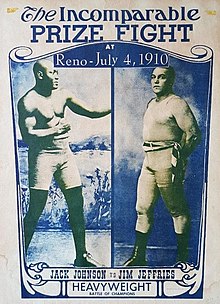 Promotional poster | |||||||||||||||||||
| Date | July 4, 1910 | ||||||||||||||||||
|---|---|---|---|---|---|---|---|---|---|---|---|---|---|---|---|---|---|---|---|
| Venue | Reno, Nevada, United States | ||||||||||||||||||
| Tale of the tape | |||||||||||||||||||
| |||||||||||||||||||
| Result | |||||||||||||||||||
| Johnson won via 15th round TKO | |||||||||||||||||||
The Fight of the Century or the Johnson–Jeffries Prize Fight was a boxing match between the first African American world heavyweight champion of boxing Jack Johnson and the previously undefeated world heavyweight champion James J. Jeffries on July 4, 1910, U.S. Independence Day. It was highly significant in the history of race relations in the U.S., and led to the Johnson–Jeffries riots in which more than 20 people died.
It was one of the most eagerly anticipated boxing matches of all time, with betting odds significantly favoring Jeffries,[2] who had come back from retirement for the fight. The lead-up to the bout was peppered with racist press against Johnson; author Jack London described Jeffries two days before the fight as "the chosen representative of the white race, and this time the greatest of them", whilst a New York Times editorial wrote: "If the black man wins, thousands and thousands of his ignorant brothers will misinterpret his victory as justifying claims to much more than mere physical equality with their white neighbors."[3][4]
Johnson beat Jeffries in the fifteenth round, approximately one hour after the fight began at 1:30 pm PST. Jeffries—who boasted that he had never been knocked down in a fight—fell three times to Johnson's punches, and was being counted out when his manager called the fight.[5][6] Race riots broke out across the country over the following week—the first truly nationwide race riots in the United States.[7][8][9]
A crowd of 18,020 attended in a stadium built for the fight, and telegraphed reports were followed across the nation. Johnson and Jeffries both made over $100,000 from the purse, bonuses, and the sale of film rights. The film – The Johnson–Jeffries Fight – received more public attention in the United States than any other film to date and for the next five years, until the release of The Birth of a Nation,[10] and was subsequently censored in many states and cities – the first movement for racist film censorship in history.[11]
- ^ "Jack Johnson". BoxRec.com. Retrieved October 27, 2021.
- ^ Orbach 2010, p. 273: Orbach cites: Betting is Peculiar, WASH. POST, July 4, 1910, at 2; 10 to 6 on Eve of Fight, N.Y. TIMES, July 4, 1910, at 14; Jeff Rules Favorite, 100–60, CHI. DAILY TRIB., July 4, 1910, at 11; Bet $40,000 on Jeffries, WASH. POST, July 4, 1910, at 2; Wall Street Slow to Place Bets on the Fight at Reno, N.Y. HERALD, July 2, 1910, at 2; How Betting Goes All Over the Country, PHILA. INQUIRER July 3, 1910, at 8; Betting Favors Jeffries; Odds of 10 to 6 1–2 Offered, ATLANTA CONST., July 4, 1910, at 9.
- ^ "Pugilists as Race Champions". The New York Times. Vol. LIX, no. 19101. May 12, 1910. p. 10. Retrieved October 17, 2022.
- ^ "A Year of Hope for Joplin and Johnson". Smithsonian Magazine. May 31, 2010. Retrieved August 14, 2022.
- ^ "Johnson Wins In 15 Rounds; Jeffries Weak", The New York Times, July 5, 1910, p1
- ^ Ed Cray, et al., American Datelines: Major News Stories from Colonial Times to the Present (University of Illinois Press, 2003), p129
- ^ "80 Years Ago, the Truth Hurt : Johnson's Victory Over Jeffries Taught Lesson to White America". Los Angeles Times. July 8, 1990. Archived from the original on August 3, 2022. Retrieved August 14, 2022.
Johnson's victory over Jeffries provided a lesson much of white America didn't learn gracefully. Johnson-Jeffries touched off America's first national race riot—several days of hundreds of violent street clashes between whites and blacks in cities across the country.
- ^ Brundage, W.F. (2011). Beyond Blackface: African Americans and the Creation of American Popular Culture, 1890–1930. H. Eugene and Lillian Youngs Lehman series. University of North Carolina Press. p. 165. ISBN 978-0-8078-3462-6. Retrieved August 14, 2022.
In response, white observers set off arguably the first— ever nationwide race riots in US. history to repress...
- ^ Allen, A.; Mace, J.W. (2017). Jess Willard: Heavyweight Champion of the World (1915–1919). McFarland, Incorporated, Publishers. p. 10. ISBN 978-1-4766-2637-6. Retrieved August 14, 2022.
The Reno fight triggered the first nationwide race riots in American history
- ^ Abel, Richard (August 1, 2004). Encyclopedia of Early Cinema. ISBN 9780415234405.
- ^ Orbach 2010, p. 273-274: "In the United States, racist movie censorship started with a movement that took over the country within three days after Jack Johnson knocked out the great white hope on the Fourth of July 1910... The final note must be dedicated to Jack Johnson, the target of the legal wildfire that banned fight films in many towns in the United States in the summer of 1910. On the Fourth of July 1910, Johnson knocked out a man who claimed to be stronger than him and for that he and many other blacks were prosecuted, and a dark wave of movie censorship emerged.
